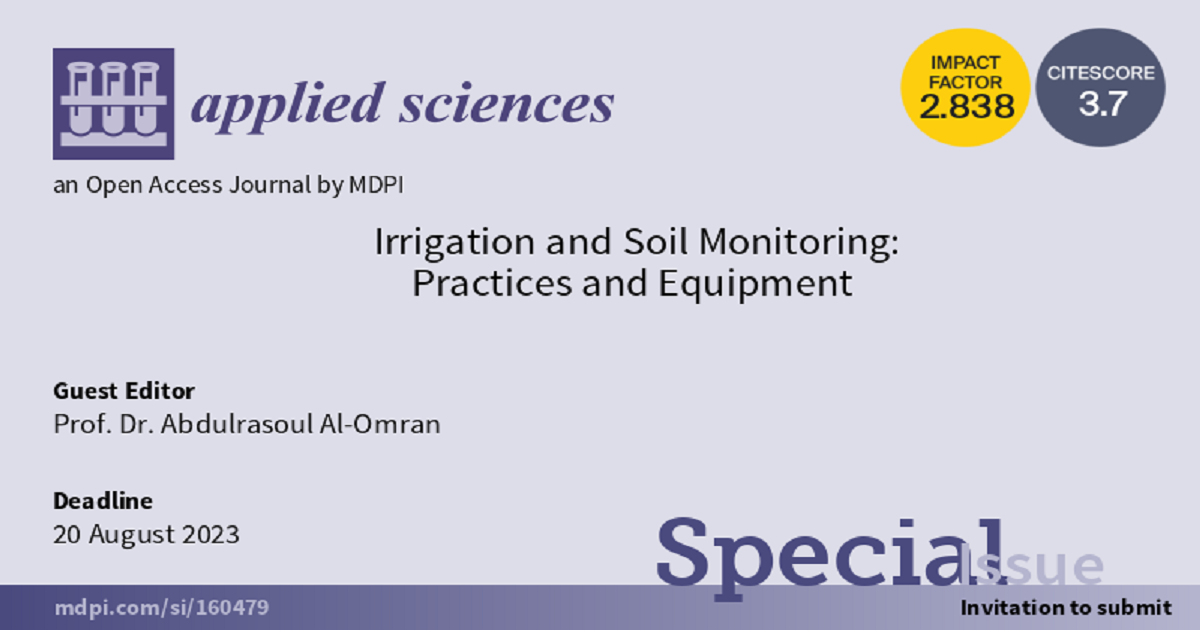Irrigation and Soil Monitoring: Practices and Equipment
A special issue of Applied Sciences (ISSN 2076-3417). This special issue belongs to the section "Agricultural Science and Technology".
Deadline for manuscript submissions: closed (20 August 2023) | Viewed by 2785

Special Issue Editor
Interests: irrigation water conservation; crop water requirements; irrigation water quality; improving soil physical properties
Special Issues, Collections and Topics in MDPI journals
Special Issue Information
Dear Colleagues,
Applied Sciences is an English language, peer-reviewed scholarly journal which publishes research articles and critical reviews from every area of the Applied Sciences. The topic of this Issue is Irrigation and Soil Monitoring: Practices and Equipment. The scope of the Special Issue covers the following:
- modernization of irrigation systems (policy–technology–performance)
- smart agriculture (sensor-based irrigation)
- precision agriculture systems
- deficit irrigation and smart irrigation
- irrigation scheduling
- treated wastewater irrigation techniques
- irrigation in salt-affected soil
- soil moisture sensors
- calibration of soil moisture sensors
- monitoring systems
- irrigation water quality
- soil amendments (biochar)
- and engineered soil substrates
I cordially invite you to submit your original research articles to Applied Sciences for publication. Before submitting your article, please review the journal's Instructions for Authors.
Please do not hesitate to contact me if you have any questions.
Prof. Dr. Abdulrasoul Al-Omran
Guest Editor
Manuscript Submission Information
Manuscripts should be submitted online at www.mdpi.com by registering and logging in to this website. Once you are registered, click here to go to the submission form. Manuscripts can be submitted until the deadline. All submissions that pass pre-check are peer-reviewed. Accepted papers will be published continuously in the journal (as soon as accepted) and will be listed together on the special issue website. Research articles, review articles as well as short communications are invited. For planned papers, a title and short abstract (about 100 words) can be sent to the Editorial Office for announcement on this website.
Submitted manuscripts should not have been published previously, nor be under consideration for publication elsewhere (except conference proceedings papers). All manuscripts are thoroughly refereed through a single-blind peer-review process. A guide for authors and other relevant information for submission of manuscripts is available on the Instructions for Authors page. Applied Sciences is an international peer-reviewed open access semimonthly journal published by MDPI.
Please visit the Instructions for Authors page before submitting a manuscript. The Article Processing Charge (APC) for publication in this open access journal is 2400 CHF (Swiss Francs). Submitted papers should be well formatted and use good English. Authors may use MDPI's English editing service prior to publication or during author revisions.
Keywords
- irrigation systems
- precision agriculture
- smart irrigation
- soil amendments
- soil moisture sensors
- calibration of soil moisture sensors
- irrigation water quality
- irrigation scheduling
- treated sewage water
Benefits of Publishing in a Special Issue
- Ease of navigation: Grouping papers by topic helps scholars navigate broad scope journals more efficiently.
- Greater discoverability: Special Issues support the reach and impact of scientific research. Articles in Special Issues are more discoverable and cited more frequently.
- Expansion of research network: Special Issues facilitate connections among authors, fostering scientific collaborations.
- External promotion: Articles in Special Issues are often promoted through the journal's social media, increasing their visibility.
- Reprint: MDPI Books provides the opportunity to republish successful Special Issues in book format, both online and in print.
Further information on MDPI's Special Issue policies can be found here.





